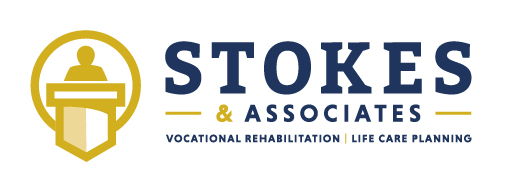Engaging Vocational Rehab and Life Care Planners in a post-COVID World
The recent Covid-19 pandemic has disrupted all our lives to some degree. For many of us, we have been on mandatory lockdown since mid-March forcing some drastic changes in how we work and live. At Stokes & Associates, we have been able to make a smooth transition to a mostly remote workplace, as our testifying experts have been conducting remote video interview evaluations for many years before the current health crisis. As many of you have gotten to know online videoconferencing platforms like Zoom quite well during the recent past, we are hoping to share some of our experiences leveraging technology to provide vocational assessments and life care plan evaluations.
Videoconferencing has been used for many years in the legal system for criminal arraignment hearings, Social Security hearings and other forms of testimony. This method has also been used to deliver medical services more efficiently in the Veterans Administration for many years and has demonstrated a high satisfaction rate among clinicians and patients. Since the Covid-19 pandemic, videoconferencing has become even more ubiquitous. For example, the U.S. Patent and Trademark Office is accommodating video hearings, and municipal offices are conducting marriage license applications via videoconference. The Tennessee Supreme Court heard its first oral arguments via videoconference.
One of the primary components of establishing a trustworthy video link is security. At Stokes & Associates, we exclusively use the Zoom Professional version with HIPAA compliance. Zoom has developed a comprehensive protocol to guarantee maximum privacy and security of the highest caliber to satisfy stringent HIPAA regulations. When we schedule an evaluation appointment, our staff forwards all the necessary documents to be returned electronically via DocuSign, allowing the evaluee to electronically sign paperwork on their mobile device with one click.
The typical methodology for conducting a vocational evaluation is to review medical records, interview the claimant, perform vocational testing, conduct vocational research, and complete the written report. Every step of this usual and customary process is possible using a remote protocol. The interview is conducted online at the claimant's convenience. Because the meeting usually occurs with the claimant in their home, we are also more likely to have the ability to interview a spouse or family member. Vocational testing is conducted online using digital stimulus materials and online response capabilities. We can collect the same achievement and interest data as an in-person interview.
Life care planning evaluations are just as efficient when conducted remotely. Again, seeing the evaluee in their home environment gives additional important information regarding mobility and safety needs. The claimant can provide us with a "virtual tour" of their home by navigating through the atmosphere, allowing us to ask questions about access. Additionally, it is often difficult for clients to remember the exact medications, equipment, and supplies that they use daily when they present for evaluations in our office. By being "in the home" with the client, we can review medication bottles, take screenshots of equipment model numbers, and get a "day in the life" view of what it is like to live at home with a physical impairment.
As testifying experts, we take our methodology very seriously. It is our rigorous reliance on generally-accepted, peer-reviewed evaluation protocols that give us the confidence to educate judges and juries of our findings. Our use of remote assessment has been supported in several state and federal court systems, allowing us to minimize travel expenses and minimize the time required to move from evaluation to final report.
We offer complimentary consultations concerning "hypothetical matters." To strategize with one of our life care plan or vocational experts at Stokes & Associates, please call David Barrett at 504-454-5009 or email dbarrett@stokesassociates.com.
Larry S. Stokes, Ph.D.
Aaron Wolfson, Ph.D.
Lacy Sapp, Ph.D.
Todd Capielano, M.Ed., LRC, CRC, LPC, CLC
Ashley Lastrapes, MHS, CRC, CCM, CLCP, LPC, LRC
